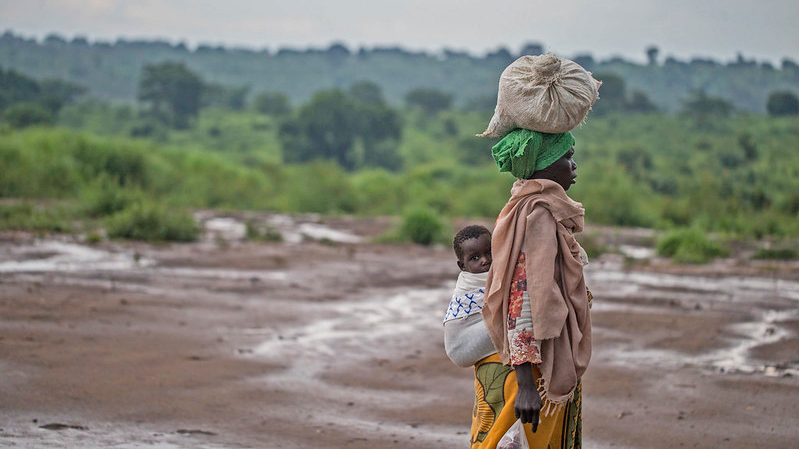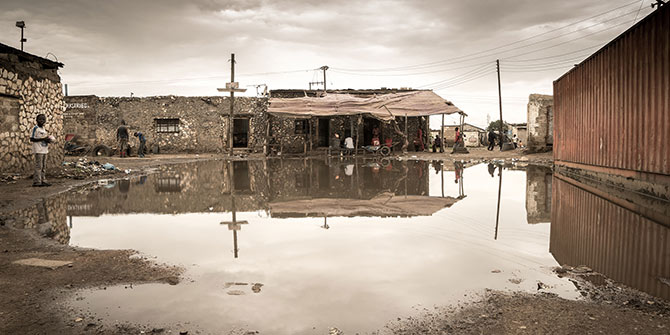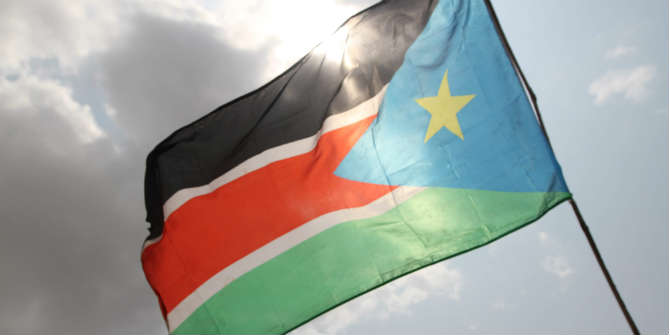Africa at LSE editor Syerramia Willoughby recounts how her distant sympathy for Ebola victims and their surviving families became a raw uncompromising and personal pain.
For better or for worse, the fates of Guinea, Sierra Leone and Liberia are intertwined. Bound together in the Mano River Basin on the tight left-hand corner of western Africa, the interlinking networks of these three countries can best be seen in the conflicts that gripped the sub-region in the 1990s and early 2000s.
It is widely accepted that the decade-long Sierra Leone civil war was a direct consequence of the civil war in neighbouring Liberia. Foday Sankoh, the leader of the Revolutionary United Front (RUF) which invaded Sierra Leone in April 1991, had trained alongside Charles Taylor in Libya and fought with Taylor’s National Patriotic Front of Liberia (NPFL) in Liberia. Although Guinea did not descend into civil war, a war of words developed between the country and Liberia about supporting each other’s dissidents. This was followed up by the French-speaking country being attacked by Guinean dissidents from Liberia and RUF rebels from Sierra Leone in 2001.
Therefore, when the World Health Organisation announced that there was an outbreak of the Ebola virus in Guinea, it was no surprise to hear that cases were also being investigated in Sierra Leone and Liberia. As the editor of the Africa at LSE blog examining social issues facing the continent, it was natural that the Ebola outbreak in Sierra Leone would be of interest. Yet my interest was more than just professional. Not only had I grown up in Sierra Leone, but I had family and friends in the country, including my father, Dr Victor Willoughby, who was a leading physician in the country.

I devoured all the newspaper reports on the progress of the disease. I also commissioned several articles on the topic for the Africa at LSE blog. Despite the natural sympathy I felt about the disastrous effect Ebola was having on peoples’ lives and livelihoods, I felt disconnected and distant from the tragedy unfolding in the country and sub-region. In a sense, it was to be expected given that I had not lived in the country for over 20 years.
On Saturday 13 December 2014, after noticing multiple missed calls from a number of relatives, I knew immediately that my dad had become the latest doctor to succumb to the disease. I had spoken to him five days earlier and I had been filled by immense foreboding as he described just how decimated the health landscape was in the country. All the private hospitals had closed down, leaving only government hospitals open. All routine operations and procedures had been cancelled. Despite having precautions in place at his private practice, my dad told me then that he had treated someone for Ebola for two weeks who had not shown the usual symptoms. The patient had had no temperature, just weakness. However he assured me that he was ok, because he had worn his protective suit while examining him. Naively, I accepted his reassurance at face value, instead of questioning him further.
I have always admired my father’s dedication to his profession. He regularly woke up about 4am in the morning, studying the latest medical books and journals, keeping abreast of the very latest developments in his field. My father was always at the disposal of his patients even if it meant a 2am home visit. He was one of the few doctors not to leave the country during the civil war, so it was unthinkable that he would shut down his surgery during the Ebola crisis. “If I was to shut down my surgery now, where would all the other ill people go?” he told one of his workers in his surgery.
Back in August, I had commissioned an article from a LSE research student doing fieldwork in Freetown which examined the role of the popular messaging application whatsapp in spreading news, rumours and hoaxes about Ebola. Little did I know that I would come to have personal experience of this. Almost as soon as my father was diagnosed with Ebola, rumours spread about his death through whatsapp. So detailed was this message that it even included details of his burial.
Now I was sucked into the raw uncompromising pain of the Ebola scourge. The pain was not just from knowing there is no recognised cure from this disease. There was also the knowledge that this is a disease accompanied with terrifying suffering including vomiting and uncontrollable diarrhoea. In addition, I was concerned that my father’s underlying health conditions of diabetes and hypertension would make survival much more of a challenge.
For five days, my life was all about waiting to make the next phonecall, whether it was to government officials to find out that requests for my father to be taken abroad for treatment had been turned down, getting updates on his condition from the excellent doctor at the Ebola Treatment Centre run by the Italy-based charity Emergency or dispelling rumours of my dad’s death from well-wishers and old friends.
There was hope though, in the form of ZMaB, a precursor of the experimental drug ZMapp which was used successfully to treat American health workers including Dr Kent Brantly. The Sierra Leone government went to great lengths to secure the last two doses in the world of this drug from Canada. On the evening of Wednesday 17 December, five days after my dad had tested positive for Ebola, the drugs arrived in Freetown. The hope that my dad could beat this disease was bolstered by knowing that my dad was still stable.
On Thursday 18 December, I woke up at 7am with excitement, because I knew that my father would shortly be receiving ZMaB. However, it was not to be. I received an urgent message to call Sierra Leone. I found out that my dad had just died from a heart attack that morning. My dad had just become the 11th doctor to die from Ebola in Sierra Leone, less than two weeks after three doctors had died in one weekend.
At times like this, it is very easy to ponder over what could have been. What if the Sierra Leonean government had an existing arrangement to fly out Ebola-infected doctors to one of the high-level isolation units for treatment of infectious diseases in Europe or USA? What if the experimental drug ZMaB was already in the country? What if? Would Sierra Leone have lost 11 of her doctors to this disease? Unfortunately, it is all too late to ask questions like these.
Rather than focus on what ifs I choose to be comforted by the fact that he had excellent care at his treatment centre and that he did not suffer the worst effects of the disease such as the vomiting and diarrhoea and that he stayed true to the values of his profession to the very end.
The views expressed in this post are those of the author and in no way reflect those of the London School of Economics and Political Science.






Rest in peace Dr. Willoughby.
Very touching, he was our family doctor for over a decade and I spoke to him a week before he was diagnosed. He was also our God Father at my wedding. Dr willoughby has left a huge gap in the medical profession in SL. We all miss him.
Sierra Leone has lost some dozen or so top medics and many nurses and other health-delivery personnel to the Ebola Virus Disease and in Dr Willoughby the country has lost a dedicated, respectful and well respected individual who always put his personal and unique relationship with patients and acquaintances foremost. May the Good Lord grant him peace.
We join you in mourning the loss of your dear dad Syerramia. Dr. Willoughby was our family doctor too. Our deepest condolences to you all. As a family, we made many requests to him to see friends and other family members and he always willingly obliged – always true to his profession. It would be very hard to replace him. A sad loss for the country which he so loved, his patients and more so, for you his family. He will be sorely missed. May he rest in peace.
Dr. Victor Willoughby was my close friend. I miss him greatly. I prayed with him whenever I was in his clinic. He was a kind, competent, compassionate doctor, ready to give service to others in medicine and in the Church.
A service in memory of our dear doctor is to be held at the St. Georges Cathedral, Freetown on Sunday 25th January and I am due to preach the sermon. I ask for your prayers that the service will bring consolation and inspiration to us all.
Let us erect a fitting memorial to this great man. Let us inspire many to emulate his patriotism, commitment, dedication, hard work, compassion and readiness to help people in all works of life. Let these qualities be replicated in the various professions and occupations–in Law, Business,, Medicine, the Services, Education etc. Let us together know that it is possible to be great through humility and service and let the youth of Sierra Leone aspire to such greatness. Let us all work together to emulate his good qualities and work assiduously to make Sierra Leone “the praise of the earth”
What we should all be doing is continue with the work your father was doing. Dr. Willougby’s fight is a call to all of us to continue fighting even in the face of the impossible odds. RIP Doc….
What a great father-in-law Dr Willoughby was! Syerramia,your dad was very personable and kind; you can be proud of that!
Your other half!
A very brave soul, your dad, and he will be greatly missed. The Ebola epidemic in West Africa should be a wake-up call for authorities in Africa to start investing seriously in the health sector. This for sure won’t be the last Ebola attack in Africa, nor is Ebola the last of such diseases to emerge out of Africa’s tropical forests, now that global warming etc is here to stay.
In the next few decades we will also have to deal with diseases we formerly associated with the West – diabetes, high blood pressure, arthritis, etc. Africa is not equipped for the health crisis that is already knocking on the door.
I met Dr Willoughby maybe just one time in all the years of our friendship and in that one time, I was firmly impressed not only of his striking posture but also his simplicity and kindness.
He was truly a man dedicated to his profession as a doctor, and unlike others in his field of work, did not lack the human touch of empathy. I believe his legacy as one of the best doctors in Sierra Leone will forever be a guide for many to follow and emulate.
He will always be missed and celebrated as a pioneer of promoting good practice in Sierra Leone and undoubtedly an excellent doctor and father.